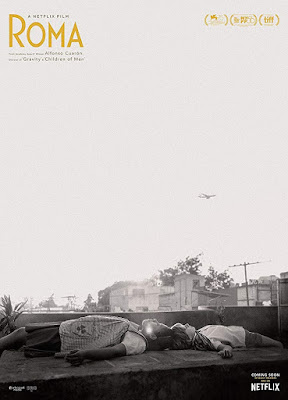The most personal project to date from director Alfonso Cuaron, Roma chronicles a turbulent year in the lives of a middle-class family in 1970s Mexico City.
After spiralling through space in Gravity and charting the collapse of society in Children of Men, Academy Award-winning filmmaker Alfonso Cuaron returns with something a lot more intimate and innately personal. Roma, which is presented in black and white and with English subtitles of Spanish and Mixtec, is a 'year in the life' of Cleo (Yalitza Aparicio), a maid in the Mexico City household of Sofia (Marina de Tavira), Antonio (Fernando Grediaga) and their four young children.
The film follows Cleo and her fellow maid Adela (Nancy Garcia) as they care for the family, clean the house, cook meals, escort the children to school and spend time with their boyfriends at the theatre during their time off. However, this isn't the idyllic slice of domestic bliss that it appears at first glance. As time wears on, we learn that Sofia and Antonio's marriage is strained. Cleo's own relationship with her boyfriend Fermin (Jorge Antonio Guerrero) faces issues of its own. After weeks and months, the status quo of the family is challenged and shaken to the core, something which we, the audience, witness through Cleo's eyes as both a key link in the familial chain but also an outsider looking in.
If it wasn't already apparent, Roma has a fairly sedate and fluid approach to narrative. Cuaron takes his time to orient the viewer in the lives of the increasingly dysfunctional family, both in a physical sense, as he winds his way through their impressive city abode, and also in an emotional sense, as he explores the fractures that exist in a familial setting - between husband and wife, brother and sister, mother and son.
The film doesn't so much plot a story so much as it unfurls a journey before you, with time blending together as milestones like first dates and Christmases wash past. The overall effect is one of intense immersion with the family and its trials and tribulations. Come the end of the film, you feel as though you've been with them every step of the way for a year of their lives, and it's an incredibly moving experience. The soaring highs, the crushing lows (seriously, it gets upsetting) flood back as you exit the theatre.
Visually Roma is a knockout, with so much detail and richness packed into every frame. From the persistent planes overhead to the smoky streets and noisy curbside vendors, Cuaron drops the viewer into the midst of 1970s Mexico City. The smells, sights and sounds ooze from the screen and surround you. The black and white doesn't rob the film of flavour at all; it serves to further place the viewer in the setting. There really isn't an aspect to Roma more important than sense of place - you feel as though you're pulled through the screen and into the family home or the cluttered rooftops.
The Verdict: 9/10
A poetic and personal project from Cuaron that explores life's big moments as well as the little ones that link them together. Unquestionably one of the best films of 2018, and one that (if you'll pardon the insufferable cliche) deserves to be seen on the big screen. With so much to take in, Roma is like peering through a window into the past and onto someone else's life - no detail or moment too small or insignificant.
Roma is screening in Perth as part of the 2018 Cine Latino Film Festival from December 6-16. For more information, visit www.cinelatinofilmfestival.com.au.




I'm definitely going to be checking this out. I'm interested that you mentioned the black and white doesn't rob the film. That's where my mind tends to go when I see it in modern film, glad to hear it doesn't do that. Great review!
ReplyDelete